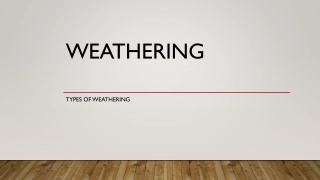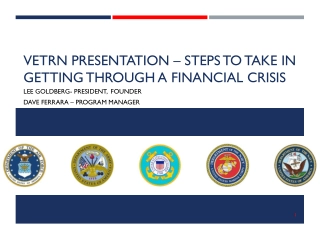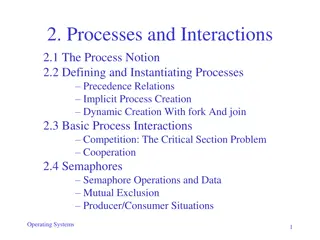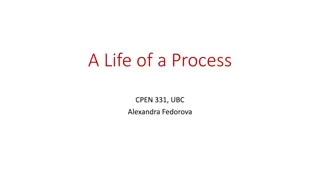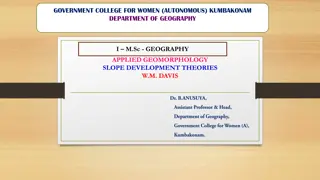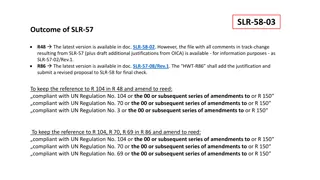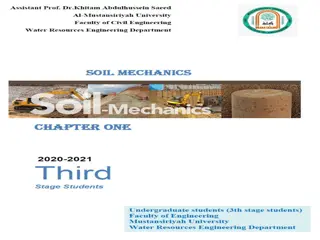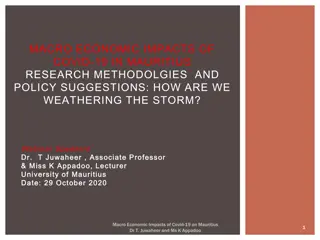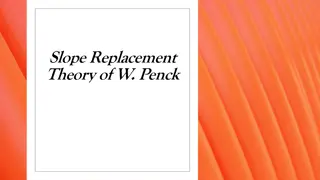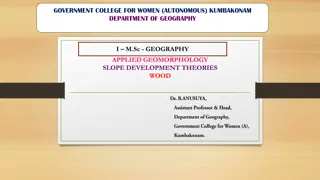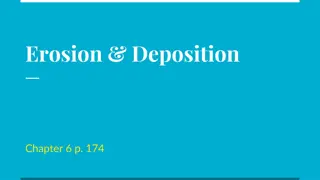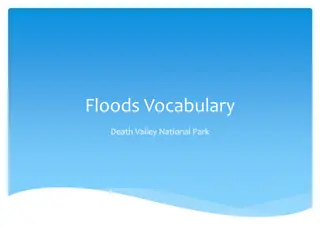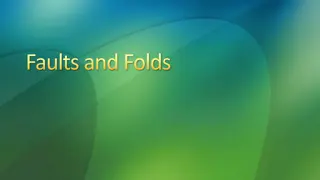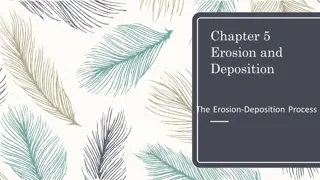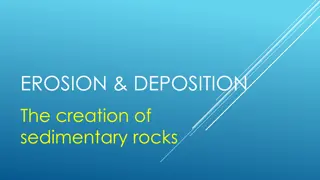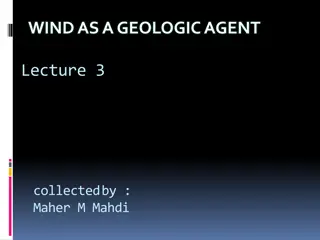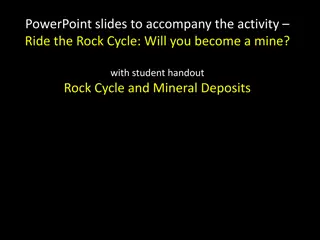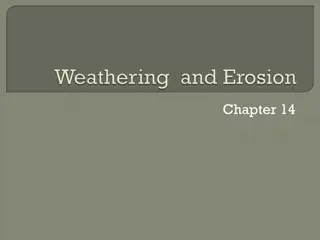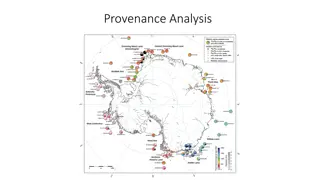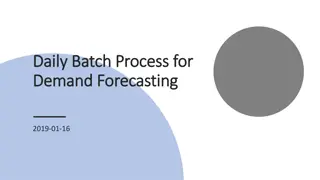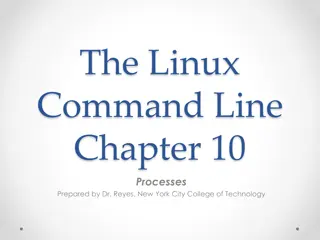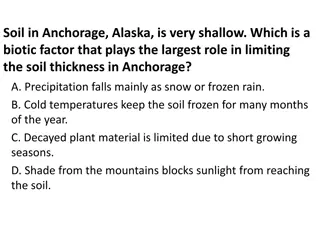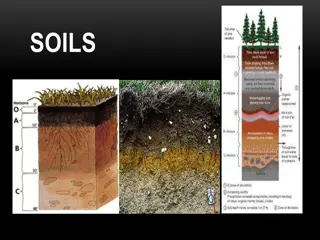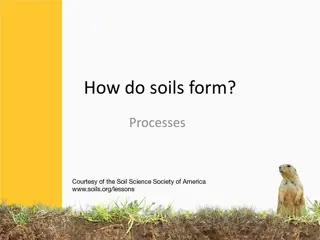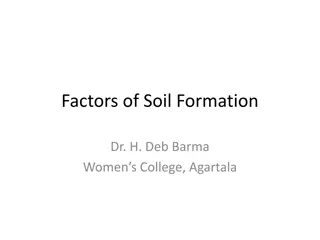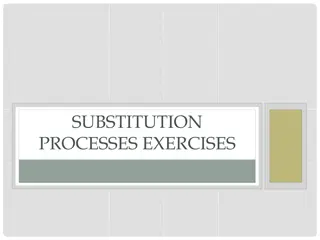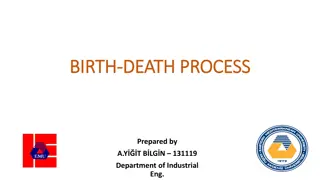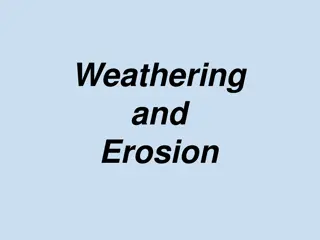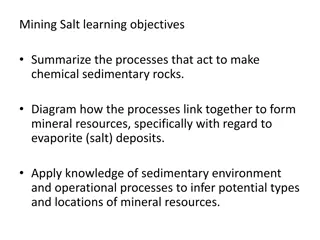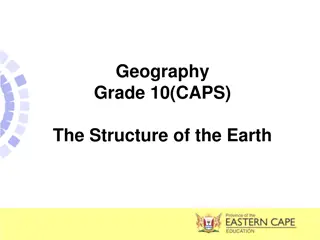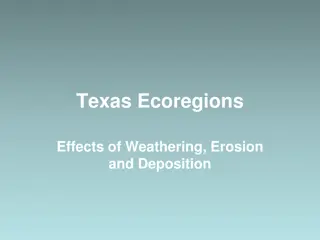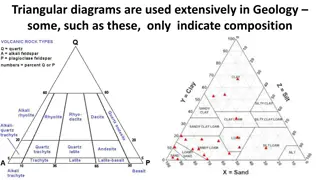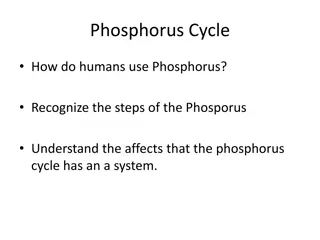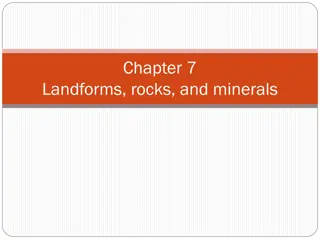Weathering: Types of Weathering
Discover the process of weathering as sun, rain, frost, and wind break down rocks over time. Learn about factors such as rock properties, climate, soil, and exposure length that influence the rate of weathering. Gain insights into different types of weathering and how they shape the Earth's surface.
1 views • 11 slides
Steps to Navigate a Financial Crisis - Practical Advice for Business Owners
Facing a sudden financial crisis can be daunting for businesses. This presentation outlines key steps to take, such as managing cash flow, prioritizing disbursements, exploring loan options, and evaluating cost control measures. By being proactive and realistic, businesses can increase their chances
0 views • 10 slides
Understanding the Carbon Cycle: Reservoirs, Dynamics, and Importance
Earth's carbon cycle plays a crucial role in sustaining life, with carbon moving through various reservoirs and processes. This cycle involves short-term terrestrial and marine cycles, as well as long-term cycles influenced by volcanic activity and rock weathering. Understanding carbon reservoir dyn
6 views • 45 slides
Processes and Interactions
Processes in operating systems involve executing programs on CPUs, with each process having its own CPU. Processes run concurrently and can cooperate or compete for resources. Defining, creating, and managing processes is crucial for system efficiency and performance. Precedence relations, semaphore
1 views • 38 slides
A Life of a Process
This content delves into the creation and management of processes in operating systems, covering concepts such as forking processes, process states, address space management, copying processes, and key functions involved in process handling. It provides insights on constructing processes from scratc
0 views • 35 slides
Understanding Slope Development Theories in Geography - Department of Geography, Government College for Women, Kumbakonam
Slope development in geography is categorized into primary and secondary slopes, formed by processes that either promote or decrease relief. This involves erosion, weathering, and deposition processes, influenced by factors like lithology, climate, tectonic movements, and vegetation cover.
1 views • 27 slides
Elastomeric Metal Roof Painting of Factories
Your roof is one of the most important investments you have. It protects your inside investment. Painted metal roofs are subject to harsh weathering from mother nature. \/\/ \/metal-roof-painting-michigan-ohio-indiana
1 views • 16 slides
Metal Roof Repairs At Commercial Painting Services
Your roof is one of the most important investments you have. It protects your inside investment. Painted metal roofs are subject to harsh weathering from mother nature. \/\/ \/metal-roof-painting-michigan-ohio-indiana
0 views • 13 slides
Comparison of Weathering Test Specifications in ECE Regulations and ISO Standards
The weathering test specifications in ECE Regulations 69, 70, and 104 are compared to ISO Standard ISO 105-B02:1978 and EN ISO 4892-2:2013 (amended in 2021). ISO 105-B02 focuses on determining the effect of artificial light on textile colors, while ISO 4892-2 defines clear apparatus conditions for w
0 views • 7 slides
Understanding Soil Behavior and Formation in Civil and Environmental Engineering
Civil and environmental engineering heavily rely on the properties and behavior of soil and rock materials for successful project outcomes. Geotechnical engineering and environmental considerations play crucial roles in dealing with earth materials. This content explores the elemental compositions o
3 views • 18 slides
Macro-Economic Impacts of COVID-19 in Mauritius: Research Findings and Policy Recommendations
The webinar conducted by Dr. T. Juwaheer and Ms. K. Appadoo from the University of Mauritius shed light on the significant macro-economic impacts of COVID-19 in Mauritius. They discussed the current status, negative impacts on various industries, industries likely to receive boosts, and key facts an
0 views • 16 slides
Evolution of Hill Slopes: Penck's Slope Replacement Theory
Penck's slope replacement theory proposes that the angle of a hill slope decreases as gentler slopes replace steeper ones, leading to the concavity of the slope profile. The model explains how vertical erosion by streams and denudation shape hillslopes, causing them to retreat in a parallel manner.
0 views • 9 slides
Slope Development Theories in Applied Geomorphology
Slopes are formed through different processes as described by Wood's slope development theories, such as the Four Unit Slope Model and the 9-Unit Slope Model. These models illustrate various manifestations of slope profiles based on factors like rock composition and water movement. Different slope t
0 views • 10 slides
Understanding Earth's Landforms: Erosion, Deposition, and Weathering
Explore the processes of erosion, deposition, and weathering that shape Earth's landforms over time. From the breakdown of rock through weathering to the movement of eroded material by erosion and the settling of sediments by deposition, witness the continuous transformation of Earth's surface. Disc
1 views • 14 slides
Understanding Natural Forces: Floods, Weathering, Erosion, and More
Explore the fascinating processes of weathering, erosion, and floods through images and definitions. Learn about the forces that shape our environment, from breaking rocks to the movement of water and soil. Enhance your vocabulary with terms related to natural phenomena like precipitation and flood
0 views • 6 slides
Geological Structures and Landscapes: A Detailed Overview
The illustrations and descriptions in the content depict various geological structures, including faults, folds, anticlines, and their effects on the landscape. The formation processes, such as folding, faulting, weathering, and erosion, are explained, highlighting how these natural phenomena shape
0 views • 9 slides
Understanding Erosion and Deposition Processes in Geology
Explore the dynamic forces of erosion and deposition in geology, from the constructive and destructive processes to weathering, erosion agents, rates of erosion, sorting of sediment, deposition, and different depositional environments where sediments settle. Delve into how factors like weather, clim
0 views • 12 slides
Understanding Erosion, Deposition, Weathering, and Mass Movement in Geology
Explore the processes of erosion, deposition, weathering, and mass movement in geology. Learn about how rocks are broken down and carried away, the different types of weathering, and the factors affecting these processes. Discover the role of gravity in erosion and the impact of chemical reactions o
0 views • 18 slides
Wind as a Geologic Agent in Shaping Landscapes
Wind has played a significant role in shaping landscapes during times of drier climates, being a key geologic agent impacting erosion and deposition processes. The global wind system, driven by factors such as heating from the sun and the rotation of the Earth, creates convection currents that circu
0 views • 31 slides
Exploring the Intricacies of the Rock Cycle Through Interactive Activities
Dive into the fascinating world of rocks and minerals with the engaging activity "Ride the Rock Cycle: Will you become a mine?" This game-based approach allows students to visualize and comprehend the complexity of the rock cycle, appreciate plate tectonics, understand the rarity of economically val
0 views • 16 slides
Understanding Weathering and Erosion Processes in Chapter 14
Weathering and erosion are natural processes that break down rocks through mechanical and chemical means. Chapter 14 explores the different types of weathering processes, including mechanical weathering like ice wedging and abrasion, as well as chemical weathering from reactions with substances like
0 views • 50 slides
Understanding Sedimentary Rock Characteristics: Provenance and Weathering
Explore the significance of provenance analysis in interpreting the origin of sedimentary rocks based on lithological characteristics. Learn about mechanical and chemical weathering processes, compositional and textural maturity, mineral stability during weathering, and how rock particles indicate t
0 views • 12 slides
Daily Batch Process for Demand Forecasting - Roadmap and Import Actions
In this data workflow, a roadmap is prepared for batch processes related to demand forecasting. It includes steps for uploading and importing data into Anaplan, SQL sources, EBS processes, and various file imports. The script names and processes are outlined with caution against renaming data hub pr
0 views • 14 slides
Understanding Programs and Processes in Operating Systems
Exploring the fundamental concepts of programs and processes in operating systems, this content delves into the definitions of programs and processes, the relationship between them, the components of a program, what is added by a process, and how processes are created. The role of DLLs, mapped files
0 views • 22 slides
Understanding Linux Processes and Controlling Them
This content provides insights into Linux processes, including parent-child relationships, process management commands like ps and top, background jobs, bringing processes to the foreground, and terminating processes. It also covers killing processes using kill and killall commands.
0 views • 7 slides
Understanding Soil Characteristics and Ecosystem Interactions
This content explores various aspects of soil characteristics, including factors influencing soil thickness, the role of bedrock in soil quality, optimal soil mixtures for plant growth, the impact of living organisms on weathering, and the formation of soil. It also discusses how animals can help so
0 views • 17 slides
Understanding Soil: Formation, Composition, and Impact on Plant Growth
Soil is more than just dirt; it plays a vital role in supporting plant growth. Formed through the weathering of rocks and organic activity, soil consists of rock fragments, clay, and organic material. The process of soil formation begins with the erosion of bedrock, leading to the development of dif
0 views • 12 slides
Understanding Soil Formation Processes and Changes Over Time
Soil formation involves several processes such as additions, losses, translocations, and transformations. Additions like rainwater and organic matter, losses from evaporation and leaching, translocations by gravity and organisms, and transformations of components all contribute to the development an
0 views • 10 slides
Understanding Factors of Soil Formation and Soil Geography
Soil formation is a complex process influenced by factors like weathering, organic matter, and minerals. Soil geography studies soil distribution using geographic methods and cartography. Various definitions of soil highlight its importance for plant growth and as a natural body with distinct horizo
0 views • 20 slides
Phonetic Processes Exercises for Linguistics Students
Practice identifying phonetic processes such as stridency deletion, stopping, fronting, and more with exercises involving target words. Determine which processes apply to various words and mark the likely processes for specific targets. Enhance your understanding of substitution processes in linguis
0 views • 5 slides
Pure Birth Processes in Industrial Engineering
Birth-death processes, Yule-Furry models, and pure birth processes are discussed in the context of industrial engineering. The study of evolutionary processes, population dynamics, and radioactive transmutations are explored through mathematical models and examples. The concept of state transitions
0 views • 19 slides
Understanding Weathering and Erosion: Processes and Impacts
Explore the fascinating world of weathering and erosion through mechanical and chemical processes. Discover how environmental agents break down rocks, leading to the formation of sediment. Witness the effects of erosion as gravity, water, wind, and ice transport rock fragments to new locations, shap
0 views • 18 slides
Formation of Salt Deposits: Processes and Mineral Resources
Understanding the processes involved in the formation of chemical sedimentary rocks, particularly evaporite deposits like salt, is crucial for inferring potential mineral resources. This involves concepts such as evaporation, chemical weathering, crystallization, and lithification, which link togeth
0 views • 4 slides
Exploring Earth's Structure and Continental Drift
Delve into the fascinating layers of the Earth, including the crust, mantle, and core, while understanding how rocks are classified and the processes of weathering, erosion, and rock formation. Discover the concept of continental drift through evidence such as fossil similarities and geological form
0 views • 10 slides
Texas Ecoregions: Effects of Weathering, Erosion, and Deposition
Texas is divided into various ecoregions each with unique characteristics impacted by weathering, erosion, and deposition. Piney Woods, Western Gulf Coastal Plain, Grand Prairie and Plains, Edwards Plateau, Rolling Plains, and Western and Eastern Cross Timbers are discussed in terms of their soil ty
0 views • 12 slides
Compositional Analysis of Rock-Forming Minerals Using Triangular Diagrams
Geologists frequently utilize triangular diagrams to determine mineral compositions in the Al2O3-SiO2-K2O system. This analysis helps identify stable minerals under Earth-surface conditions, considering primary weathering minerals. The process involves calculating mole percentages of oxides in miner
1 views • 25 slides
Commercial Painting Contractor Metal Roof Painting
Your roof is one of the most important investments you have. It protects your inside investment. Painted metal roofs are subject to harsh weathering from mother nature. \/\/commercialpaintingservices.com\/metal-roof-painting-michigan-ohio-indiana
0 views • 16 slides
Understanding the Phosphorus Cycle and Its Impact on Ecosystems
Humans use phosphorus in various ways, from being a vital component in DNA, RNA, and cell membranes to its role in energy transfer processes. The phosphorus cycle involves steps such as weathering of rocks, phosphate mining for fertilizers, excretion/decomposition, and geologic forces. However, exce
0 views • 8 slides
Understanding Earth's Changing Crust: Landforms, Rocks, and Minerals
The Earth's crust is in constant motion due to plate tectonics, which results in various landforms, rocks, and minerals. This movement is driven by forces such as tension, compression, and shear, causing earthquakes, mountains, and volcanic activity. Through processes like weathering and erosion, th
0 views • 26 slides
Transforming Geoscience Education with Remote Electron Microscopy
Expanding the use of online remote electron microscopy to enhance undergraduate geoscience education at Valencia College through a project focused on evaluating sands remotely using an operated scanning electron microscope. Students collect and analyze various sands using different tools and techniq
0 views • 10 slides
